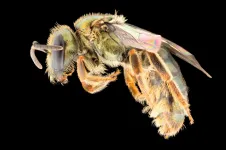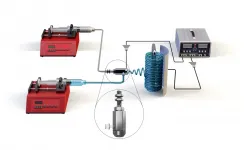(Press-News.org) This press release is in support of a presentation by Dr Gulam Bahadur presented online at the 37th Annual Meeting of ESHRE.
29 June 2020: Studies indicate that the optimal and safe number of oocytes needed for achieving an ongoing pregnancy is between six and 15. However, the use of egg freezing, frozen embryo replacement (FER) cycles and aggressive stimulation regimes has increased this number in order to boost success rates in older women and in poor responders who produce fewer eggs. What is not known is the impact of numbers of eggs retrieved and of over-stimulation practices on the health of patients, and on their emotional and financial well-being.
Now, a retrospective observational study suggests that IVF clinics in the UK may be retrieving "far too many oocytes" and that most of them "may never be used and are probably discarded". Details of the analysis are presented today online at the virtual Annual Meeting of ESHRE by Dr Gulam Bahadur from North Middlesex University Hospital, London, who said the results may well reflect global practices too.
The findings based on number of eggs extracted versus IVF cycles show that a total of more than 1.625 million eggs in the UK were retrieved from 147,274 women between 2015 and 2018. Although an average of 11 eggs was collected per patient, 16% of cycles were associated with 16-49 oocytes retrieved (per cycle) and 58 women each had over 50 eggs collected in a single egg retrieval procedure.
"Our observations suggests that the high oocyte number per retrieval procedure needs re-evaluation," says Bahadur. "In particular, this needs to focus on the side effects, including ovarian hyperstimulation syndrome and procedure-related complications, and on the fate of unused frozen oocytes and the costs associated with freezing them.
"Patients should be advised that it's better to collect fewer eggs leading to good quality embryos which may go to term and result in a healthy baby."
This report is based on all UK IVF clinics and relates to non-donor fertility treatment carried out between 2015 and 2018 during which 172,341 fresh oocyte retrieval cycles took place. All outcomes and patterns remained uniform over the four years.
The study showed that a sizable number (n = 10,148) of cycles did not yield any oocytes.
More than half (53%) of all IVF cycles were in the desired egg yield range of 6-15. In addition, a quarter of cycles (n = 42,574) yielded 1-5 eggs; 14% (n = 23,794) produced 16-25; and a minority (2% or 3,970) resulted in 26-49 oocytes. The authors point out that multiple birth rates increase significantly from 6-15 oocytes onwards, which presents a risk to patients and babies such as birth complications and low birth weight.
A total of 931,265 embryos resulted from all eggs retrieved - a fertilisation rate of 57%. Of the embryos created, more than one in five (22% or 209,080) were transferred into the uterus, while a slightly higher proportion (24% or 219, 563) were frozen.
The fate of the unfertilised oocytes (43%) is unknown, but they are likely to have been discarded, as is normal practice. The authors say that most of the embryos not transferred (54%) will likely be discarded after patients have paid for several years of maintaining them in storage.
"This comes with a financial and emotional cost," says Bahadur. "Patients build an attachment with this frozen material and there's insufficient counselling to support them. They should be given more information about the implications of freezing eggs and embryos."
INFORMATION:
Presentation 0-106, Tuesday 29 June 2021
Non-donor IVF treatment cycles in the UK need to be re-evaluated against the 1.625 million oocytes retrieved
Notes
1. All UK fertility clinics are legally obliged to provide IVF data as part of their licence agreement.
2. Data used in this study was obtained from UK HFEA under the Freedom of Information Act 2000.
3. In the case of fresh oocytes, data was acquired for the number of cycles retrieving 1-5, 6-15, 16-25, 26-49, 50-59, and 60+ oocytes.
4. Data on the maximum number of oocytes collected (50 and above) was not provided by the HFEA for technical reasons.
* When obtaining outside comment, journalists are requested to ensure that their contacts are aware of the embargo on this release.
For interviews with the Article author, please contact: E) weidongyin@sinovac.com T) +86 (0)10 82799630.
For embargoed access to the Article and Comment, please see: http://www.thelancet-press.com/embargo/childrencoronavac.pdf
For embargoed access to the Appendix, please see: http://www.thelancet-press.com/embargo/childrencoronavacAPPX.pdf
After centuries of human impact on the world's ecosystems, a new study from Flinders University details an example of how a common native bee species has flourished since the very first land clearances by humans on Fiji.
In a new paper in Molecular Ecology (DOI: 10.1111/mec.16034), research led by Flinders University explores a link between the expansion of Homalictus fijiensis, a common bee in the lowlands of Fiji, which has increased its spread on the main island Viti Levu alongside advancing land clearance and the introduction of new plants and weeds to the environment.
"Earlier research connected the relatively recent population expansion to warming climates, ...
What is unique about the study is the combination of interviews with current and former people in prison, custodial professionals, and healthcare providers to identify and understand barriers in delivering high-quality healthcare and support to those in custody. In addition, researchers gathered data on the number, types and stages of cancers diagnosed in patients within prisons.
Moving forward, the researchers believe that findings from this study will help inform prison cancer care policy and develop priorities for improving it within the prison system. The research was funded by the National Institute for Health Research (NIHR), the research partner of the NHS, public health and social ...
Arlington, Va., June 29, 2021 - In the midst of the COVID-19 pandemic, infection preventionists at two Southern California hospitals took extreme measures to stop the spread of a deadly fungus that has emerged in the U.S. and around the world. The two will detail their proactive responses in oral presentations today at the Association for Professionals in Infection Control and Epidemiology's (APIC's), 48th Annual Conference.
In separate responses, Scripps Memorial in La Jolla and UCLA Health in Los Angeles isolated suspected or confirmed patients, worked closely with public health departments and information technology and lab teams at their facilities, and implemented aggressive measures ...
The devastating 2012 - 2016 drought in California triggered widespread tree cover loss and die-offs of a variety of species in the region. A new study in the open access journal Frontiers in Climate is the first to show that California's iconic blue oak (Quercus douglasii) woodlands have also decreased by more than 1,200 km2. By another metric, which reflects the altered or deteriorating condition of the tree cover, the blue oak range has lost over 600 km2 in addition. These findings highlight the need to raise awareness about the vulnerability of these ecosystems and to adapt conservation strategies to increasing climate extremes.
"Our ...
Black men most likely to benefit from advanced prostate cancer therapies are 11 percent less likely to get them than non-Black men. This happens despite apparent equal opportunities in obtaining health care services, a new study in American veterans shows.
Publishing in the journal Cancer online June 29, the study showed that Black male veterans were slightly (5 percent) more likely to receive radiation or surgery for prostate cancer than non-Black men and that veterans of all races likely to benefit from such definitive therapy were also 40 percent more likely to get it compared to those who did not need it.
Led by researchers from NYU Langone Health and Perlmutter Cancer Center, the new analysis showed ...
A new paper in JNCI Cancer Spectrum, published by Oxford University Press, indicates that many survivors of adolescent and young adult cancers hesitate to obtain COVID-19 vaccinations.
As of March 2021, there were over 33 million cases and 580,000 deaths from COVID in the United States. Vaccines offer the best hope to control the spread of COVID-19. Some 20%-40% of the US population, however, is hesitant to obtain COVID-19 vaccination. Cancer survivors often have weakened immune systems and are more likely to develop severe respiratory infections, making them particularly vulnerable to the threat of COVID-19.
National organizations recommend strongly ...
According to the World Health Organization, about 785 million people around the world lack a clean source of drinking water. Despite the vast amount of water on Earth, most of it is seawater and freshwater accounts for only about 2.5% of the total. One of the ways to provide clean drinking water is to desalinate seawater. The Korea Institute of Civil Engineering and Building Technology (KICT) has announced the development of a stable performance electrospun nanofiber membrane to turn seawater into drinking water by membrane distillation process.
Membrane wetting is the most challenging ...
CORVALLIS, Ore. - Research by a graduate student in Oregon State University's College of Science has upended the conventional wisdom that for a century has incorrectly guided the study of a toad listed as endangered in part of its range.
Anne Devan-Song used spotlighting - shining a light in a dark spot and looking for eye reflections - to find large numbers of the eastern spadefoot toad. The study illustrates how confirmation bias - a tendency to interpret new information as ratification of existing theories - can hamper discovery and the development of better ones.
Her findings, which show that the toad spends much more time above ground than commonly believed, were published in the Journal ...
Chestnut Hill, Mass. (6/29/2021) -- A new, first-of-its-kind study led by researchers from Boston College has found that personal networks in India could play an important role in advancing the adoption of a cleaner cooking fuel, in this case liquefied petroleum gas, according to a report published in the journal Environmental Research Letters.
"This is the first report in clean cooking research to show that just like with tobacco use, obesity, or physical activity -- where our networks play a role in shaping our behaviors and decisions -- we find that personal networks are also associated with what kinds of stoves rural poor use.," said study co-author ...
The tiny mouse embryo has a heart that beats. Its muscles, blood vessels, gut and nervous system are beginning to develop. But this embryo is unusual: It was made in a lab, out of mouse embryonic stem cells, and represents the most sophisticated in vitro (in a dish) model of a mammal ever so created.
This new model, developed at the University of Virginia School of Medicine by Christine and Bernard Thisse, is a major step forward in scientists' efforts to mimic the natural development of a mammal by using stem cells. Its existence is a wonder that will help scientists understand mammalian development, battle diseases, create new drugs and, eventually, grow tissues and organs for people in need of transplants.
"We found a way to instruct aggregates of stem cells to initiate ...



